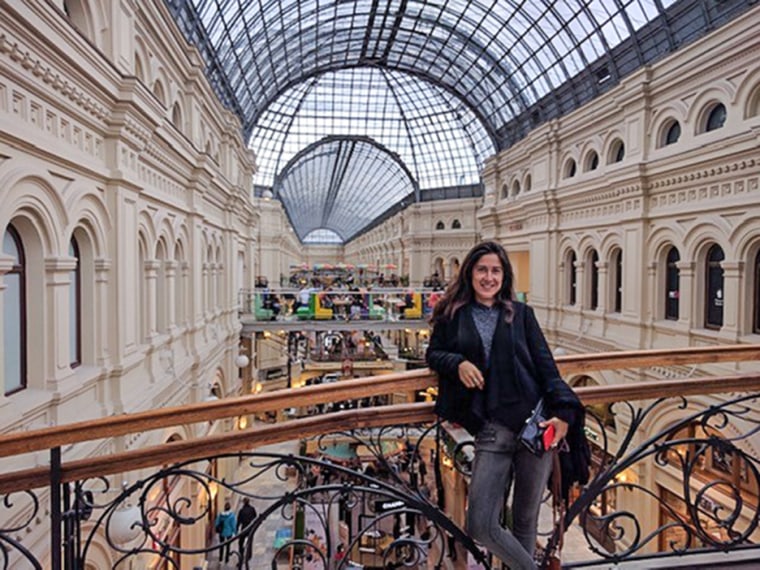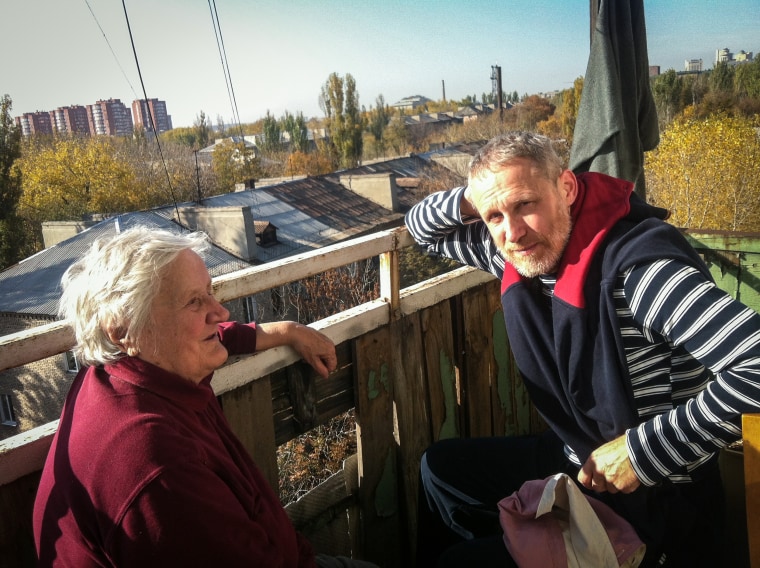When I emigrated from Moscow to California as a 12-year-old in 1996, I swore that one day I would return to live in Russia. My mother had won a green card in the U.S. immigration lottery, happy to escape the turbulence of the 1990s, but I liked my life in Moscow and dreamed of witnessing my country coming into its own.
It shouldn’t be hard to feel deep sympathy for Ukraine without becoming indiscriminately anti-Russian.
Though half of my family lived in Ukraine, I identified as Russian — even more so once I became an immigrant. Being Russian distinguished me not only from the American kids at school, but also from other immigrants from the former USSR. Most of them came at a younger age and no longer spoke their mother tongue, whereas I planned to hold on to the Russian language as long as I could. At 15, I even started a national magazine in Russian to try to inspire love for the language among my peers.
In 2012, I finally moved back to Moscow. A wave of protests against Vladimir Putin was grabbing headlines around the world, and I felt like it was the right time to return to Russia as it became more democratic. But what I found there disillusioned me. Once I saw the protests with my own eyes, I grew pessimistic that they would succeed in bringing any change. It was as if the protesters came out to be heard without believing anyone in the Kremlin would actually listen. Overall, people seemed either exhausted by a hard life in a huge, fast metropolis or spoiled by their recent financial gains and indifferent to political change.
I also had a difficult time relating to Russians. I didn’t know the ins and outs of their politics, just as I didn’t know who their trendiest musicians or most popular authors were. Even their language had changed. Modern Russian was full of new slang words I wasn’t versed in. I felt like an outdated Russian of a certain vintage — and realized that, unbeknownst to me, I had become more American than I thought. My Moscow sojourn lasted only a few months. When I returned to the U.S., I still mentioned my Russian roots if someone asked about my name or noticed my slight accent, but I was no longer billing myself as the “Russian girl.”

However, when I gave birth to my son several years later, I again found myself deeply invested in my native language and culture. I wanted to give my American child the gift of otherness, a second identity he could slip into whenever he liked, to share with him its unique sounds, traditions and tastes. So I sang him Russian lullabies, bought him Russian books, drove him across town to the Russian-language day care and got help from his Russian-speaking grandparents. All that was left was to show him the actual country.
In June, I was going to take my now 4-year-old to Moscow so he could see where I’d grown up. I told him we’d ride the metro, see the circus, hang out with my brother’s family at their dacha and then maybe swing by Kyiv to visit his Ukrainian aunts and uncles. On Feb. 24, when Russian forces began their invasion of Ukraine, I knew we weren’t going anywhere. Yet more than a month later, I still haven’t brought myself to tell him.
Now, as a full-scale fratricidal war rages, inviting anti-Russian campaigns in Europe and the U.S., I am reckoning with my identity once again.
On the second day of the invasion, I was hiking in a park with my family when two American women overheard me talking to my son. They stopped to ask what language I was speaking. When I said Russian, they looked at me askance and said, “Oops!” It was the first time since my early months of immigration that someone had made me feel bad for speaking my language.

I didn’t bother telling them that Russian is spoken by many immigrants from Ukraine, as well, not to mention from Belarus, Moldova and several other former Soviet republics. I also didn’t tell them that a third of my family is from Ukraine and has been living with a war in the eastern Donbas region for eight years or that my cousins in Kyiv were hiding in bomb shelters or that my brother in Russia was looking to leave a country where protesters are tracked down and arrested through facial recognition in what has become a real-life version of George Orwell’s “1984.” I simply walked on.
It was a tiny incident compared to some of the anti-Russian attacks on businesses and the myriad cancellations, renamings and expulsions of Russians since the war began. But it still made me feel judged and misunderstood. Though I get the desire to punish a bully, I fear that rather than make Russians rise up against Putin (which, unfortunately, is nearly impossible under the country’s police state conditions), these actions are turning Russians against the West, not toward it.
I already see it happening with some of my childhood friends in Moscow. Though none of them support Putin, they blame the West for its role in this war and ask me whether I’m afraid of being Russian in America.
I tell them that what I am afraid of is how quickly this war is radicalizing people, splitting families and severing lifelong friendships. I have been incredibly lucky that everyone in my family agrees on how we view this war — that Putin is the aggressor and Ukraine must be saved. If my brother in Moscow was a staunch supporter of the war, I don’t know how that would affect our relationship.
However, I constantly hear tragic stories of Ukrainian and Russian immigrants forced to take sides in this conflict or being punished for their views. A friend from Crimea who lives in the U.S. no longer speaks with his mother, who also lives here, because they disagree about the war. Another friend was bullied by Ukraine supporters after she publicly said a Ukraine nonprofit was too political.
I, too, find myself falling into the trap of taking sides. When I hear my Moscow friends not expressing sufficient sympathy toward Ukrainians, I want to shame them. Then, when I hear my Ukrainian nanny talking about all the bloodthirsty Russians, I want to prove to her that Russia still has plenty of good, conscientious citizens; they just have nowhere to express themselves.
As a full-scale fratricidal war rages, inviting anti-Russian campaigns in Europe and the U.S., I am reckoning with my identity
Like a child of divorcing parents, every time I choose a side, I realize that the choice is a false one. It shouldn’t be hard to feel deep sympathy for Ukraine without becoming indiscriminately anti-Russian.
As we get closer to June, I don’t know how to tell my son we aren’t going to Moscow or Kyiv any time soon. I don’t know how to explain to him that some of the relatives I wanted him to meet are no longer there, that they are instead roaming in Europe in search of a future.
What I do know is that I don’t plan to throw out all his Russian books because our family in Ukraine is suffering at the hands of Putin. I still hope that one day I can take him to a Russia where people can say what they want and a Ukraine where people can live in peace. But for now, I’ll keep speaking Russian to him. Demonstrating that Russian isn’t just the language of the aggressor has never been so important.
Source: | This article originally belongs to Nbcnews.com










